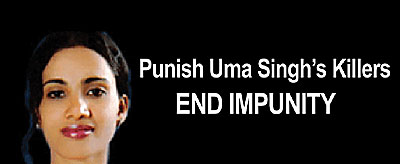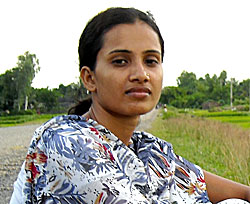 |
You could say the same about Nepal. Radio journalist Uma Singh's brutal murder in Janakpur in January underlined the fact that more journalists have been killed since the ceasefire than during the war. Women journalists, especially in the Tarai, are under pressure to quit the profession. Rishi Dhamala's conspiratorial imprisonment and the nationwide sense of fear and self-censorship today show that life and liberty of journalists are seriously threatened.
After the Maoist were elected to power, we all thought that the ex-rebels no longer needed to resort to violence and intimidation. Instead, in government, they have become even more belligerent bullies.
And to distract attention from the attacks on media and the country's pressing development needs, Nepal's two armies are engaging in dangerous political brinkmanship. In a clear bid to sabotage the compromise reached between coalition partners not to intervene in the recruitment of Nepal Army, guerrilla commanders have declared that they too are enlisting fighters. To do what? And who will foot the bill?
Prime Minister Dahal needs to aim his rhetorical prowess towards his own cadres rather than the press. He is still blaming the messenger and this week let off another tirade against the influence of "big media outlets" and "large circulation" newspapers. He needs to be careful: airing his insecurities in public makes him appear weak. It may unleash storm troopers of his YCDL by beginning to attack 'class enemies' in the media again.
 |
The belief that journalism, like soldiery, is more suited to the warlike male temperament still finds currency. But Nepali women journalists have shown that when it comes to grit, determination and integrity they are as professional as their male colleagues.
In addition to common concerns of the profession (personal safety, work conditions and job security) women journalists have to struggle against at least three other factors: balance family with a profession in which deadlines are sacrosanct and working hours unpredictable; in the newsroom they have to overcome strong gender bias and perform better to prove their worth; but the most dispiriting is feedback that degrades their contribution. No wonder only the determined women survive in journalism long enough to make a mark.
Who can forget Durga Karki of Sagarmatha FM facing rifle-wielding soldiers during the royal-military rule? Nirmala Acharya of RSS, who has made the rights of stringers her cause. Usha Titikshu, the photojournalist who goes boldly forth where no man has gone before. Yashoda Timilsina has to overcome YCDL threats in her reporting while simultaneously bringing the cause of women journalists to the notice of the Federation of Nepalese Journalists.
Our own Shailee Basnet climbed Chomolungma and pushes the envelope in her journalism. And, in these pages, Mallika Aryal tries to make sense of interesting times with flair, sensitivity and fairness.
This Women's Day, let's salute Nepal's women journalists who have struggled against great odds to do the profession proud.



